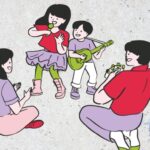In the Confucian-influenced cultures of East Asia, particularly in Vietnam, the concept of “the sins of the father are visited upon the children” is not just a warning but a way of life passed down through generations. The wrongdoings of parents can impact not only their own character and destiny but also bring about negative consequences for their offspring.
1. Deception and Theft:
The ancient wisdom states, “Ill-gotten gains never prosper.” When parents resort to deception and theft, the short-term gains are outweighed by the inevitable consequences. Not only do they face societal scorn and loss of honor, but their children also bear the brunt of their actions.

Children born into families with a tainted reputation often face bullying and social stigma. This can lead to low self-esteem, social isolation, and even mental health issues. As a result, they may struggle to form meaningful friendships and find themselves shunned by their peers, impacting their future prospects.
According to ancestral beliefs, wealth gained through deception carries a heavy “karma.” Eventually, it will be lost, bringing misfortune to the children. Therefore, parents are advised to earn an honest living, even if it means a slower path to success, so that their children can hold their heads high with pride.
2. Abuse and Oppression of the Vulnerable:
One of the gravest sins, according to ancestral teachings, is the abuse and oppression of those less fortunate. This includes employees, domestic workers, and even one’s own family members.
When parents regularly resort to verbal and physical abuse, they not only incur bad karma but also instill fear and resentment in their children. Growing up in a violent environment can lead to psychological issues and an increased likelihood of repeating the abusive behavior.
Moreover, in today’s society, where moral values and human dignity are highly regarded, a family with an abusive parent will struggle to integrate into the community. The children will bear the stigma of their parent’s actions, potentially losing out on educational and career opportunities.
3. Betrayal and Immoral Conduct:
Ancestors placed great importance on honor and duty. Parental betrayal, whether in marriage, breaking promises, or turning against those who helped them, is considered a grave sin.
Immoral conduct and a disregard for societal norms create a chaotic family environment. Children raised in such circumstances often miss out on essential life lessons and struggle to develop a sense of right and wrong. They may be more susceptible to negative influences and are at risk of following a similar path.

Additionally, society often judges children based on their parents’ actions. Even if the offspring are talented and successful, they may still face discrimination and prejudice, hindering their career paths.
Karma is not just spiritual but also a social consequence:
While many associate karma with spirituality, it is also a logical outcome of one’s actions. Parental wrongdoing creates a negative reputation, stigma, and a distorted educational environment, directly impacting their children.
In contrast, parents who lead virtuous lives, uphold their integrity, and respect others leave their children with an invaluable intangible asset: societal honor, trust, and a moral compass. This solid foundation enables children to embark on their life journeys with confidence and dignity.
As our ancestors wisely stated, “For descendants to prosper, parents must first cultivate virtue.” By avoiding the three aforementioned sins, parents not only protect themselves but also pave a bright, happy, and free future for their children.
“A Fortunate Sign: How Children with This Trait Bring Fortune and Success”
In the realm of parenthood, a fascinating folk belief exists where children are perceived as either a blessing or a debt collector. This ancient notion suggests that some children are born to repay a karmic debt to their parents, while others arrive to collect on a promise. It begs the question: Are your children angels of gratitude or seekers of retribution? This intriguing concept delves into the mysterious bonds that tie families together and raises profound questions about the nature of destiny and gratitude.
5 Signs Your Child is Destined for Greatness: Unlocking the Secrets to Their Success
Nurturing Blessed Children: Unveiling the 5 Signatures of Kindred Spirits
Are you curious to uncover the distinctive traits that signify a child’s innate goodness and their profound connection with their parents? Discover the five remarkable characteristics that serve as tell-tale signs of a blessed bond between a child and their caregivers. These attributes are more than just coincidences; they are indicators of a profound and loving destiny.





































